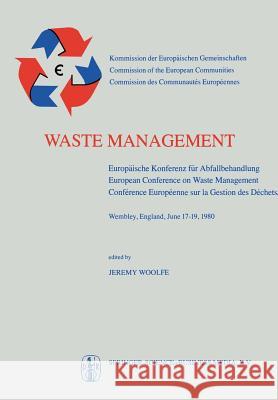Waste Management: Europäische Konferenz Für Abfallbehandlung / European Conference on Waste Management / Conférence Européenne Sur La Ge » książka
Waste Management: Europäische Konferenz Für Abfallbehandlung / European Conference on Waste Management / Conférence Européenne Sur La Ge
ISBN-13: 9789401099448 / Angielski / Miękka / 2014 / 277 str.
Waste Management: Europäische Konferenz Für Abfallbehandlung / European Conference on Waste Management / Conférence Européenne Sur La Ge
ISBN-13: 9789401099448 / Angielski / Miękka / 2014 / 277 str.
(netto: 191,66 VAT: 5%)
Najniższa cena z 30 dni: 192,74
ok. 16-18 dni roboczych.
Darmowa dostawa!
The EEC's heavy dependence on imported raw materials, combined with insufficient priority given to recuperative technologies, provided twin incentives to convene the European Conference on Waste Management. The conference was also held in answer to a call for a serious interna tional forum to enable high calibre spokesmen to express their views on a diversity of vital interests. The ambitious objective was that such a melting pot would smooth the road to cohesive policies and purposeful action, especially in the field of waste recycling. Among the speakers there were several specialists ready to outline the state of the art of a variety of technical subjects. This range included aspects of packaging, hazardous waste, the utilisation of waste in agri culture, energy from waste, and waste paper. aper was to play a particularly serious role, because pulp and paper is the largest external commodity need by the EEC countries after oil. Speakers were to be drawn from all parts of the EEC, in the expectation that country-to-country comparisons would stimulate progress in specific areas. This hope was frequently realised. Well represented was the Environment and Consumer Protection Department of the Commission itself. It is this department that has been quietly setting the beginnings of a coherent policy for waste management for throughout the 250 million population Community for the past seven years."











